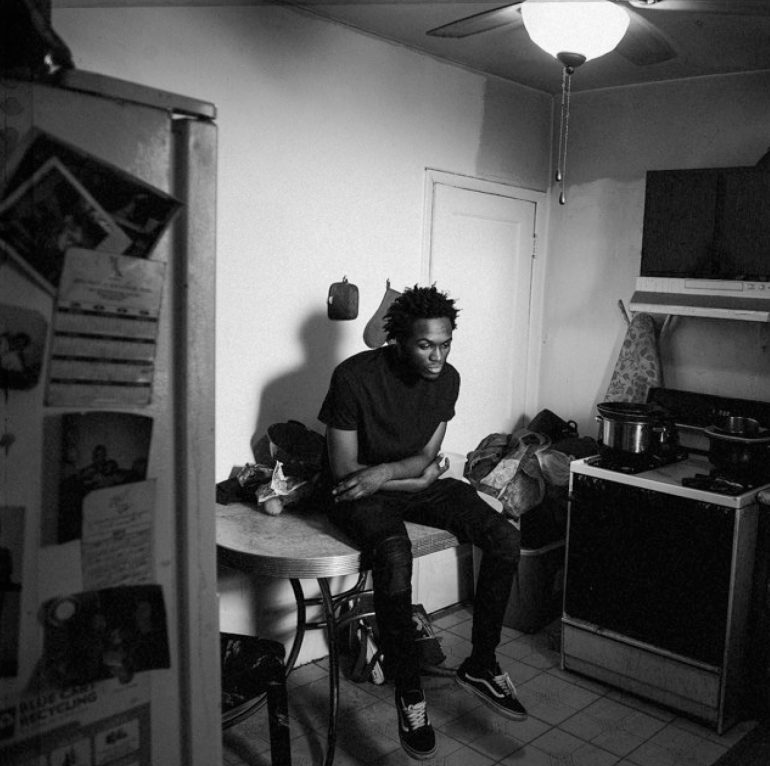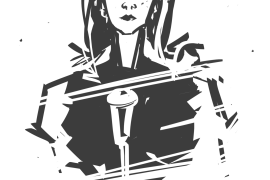Just a year and a half after releasing his excellent debut album “Bucket List Project,” rising independent rapper Saba has returned with an even more cohesive and thought-provoking album that sets him at the front of the pack of hip hop’s next generation of talent.
The 23-year-old rapper’s new album “CARE FOR ME” opens with “BUSY/SIRENS,” an extended version of the album’s lead single that sets the tone and introduces many of the album’s themes. “I’m so alone,” he opens the track, before exploring different sources of loneliness and alienation: the loss of friends and family, the reality of touring, awkward memories of adolescence, being black in America. One of the most affecting lines comes during the bridge between the song’s two halves: “I don’t need nobody new to miss.” In many ways, this is a thesis statement for Saba’s mental space throughout the album as he begins to reflect on loss and attempts to reconcile the complicated emotions that growing up in Chicago has left him to deal with.
“CARE FOR ME” is a distinct departure from the upbeat, hopeful sound of “Bucket List Project,” which deftly combined soulful influences with the bombastic production of contemporary trap. Saba’s shift in tone on this album is directly related to a specific event, one that is integral to discussing this album: the murder of his cousin and close friend Walter Long Jr., who recorded under the stage name John Walt. A promising talent in his own right, Long was fatally stabbed in Chicago on Feb. 8, 2017 and his tragic death sent shockwaves through the Chicago music scene.
Saba has become a masterful rapper, and his genuine love for the craft is evident. His delivery is effortless, incorporating internal rhyme and creative, ever-changing flows all with the ease of a friend telling a story. His talent for simple but effective imagery contributes significantly to the mood of the album, conveying complex sentiments such as the looming presence of death and trauma through one-liners like, “Chalk outline look like the shape of my shadow.”
A self-aware creator, Saba often reflects on both his role as an artist and his own internal struggles throughout his work. “CALLIGRAPHY” finds Saba directly discussing writing as a means of confronting his reality. “Everyone leavin’, I write ‘em away, write ‘em away,” he sings in the affecting chorus. Later he reflects on the state of rap and pitfalls of the music industry on “GREY.”
One of Saba’s greatest strengths is the honesty in his writing—how effective he is at rooting his storytelling in observations that are deeply relatable and human, and his ability to imbue such ines with nuanced humor. At one point, he provides evity with the anecdote, “I was at Columbia, a damn near straight-A student/I had one B in a hip-hop class, I thought that shit was stupid,” an especially effective punchline given its place on an album that cements Saba as on-track to be among the greatest rappers of his generation. Saba himself co-produced the album alongside two other producers, DaedaePIVOT and Daoud. That such polished, nuanced and engaging music was created by largely unknown producers is an impressive feat and testament to the level of genuine talent present on the album. The trio’s production effectively combines jazzy instrumentation from piano, guitar, horns and more with a hazy soundscape of synths.
“LIFE” is the album’s one certified banger, a show of rap prowess from saba in which he angrily addresses many of the systemic tribulations and anxieties related to being black in America. “LOGOUT” finds Saba reuniting with fellow Chicagoan rap star Chance the Rapper to reflect on the distancing effects of social media over an unusually understated beat that fits nicely with Chance’s laidback flow. “SMILE,” another album highlight, sits at the midway point of the project and provides a slight relief from the somber nature of the tracks that precede it. The song radiates warmth over a dynamic and memorable bassline, with Saba reminiscing on his childhood and reflecting on family history.
Long’s death looms heavy over the album but is only ever referenced in passing. In a way, it feels as if Saba is avoiding addressing it directly. He finds a solution in the brilliant penultimate track “PROM / KING,” a seven-and-a-half minute celebration of his cousin’s life. While Saba relays fond memories of his cousin, the drums and storytelling gradually get faster as the track progresses, as if racing, out of Saba’s control, toward the inevitable conclusion of Walt’s story. Horns, background vocals, and sparkly piano riffs accent the instrumental, but by the end of the track the drums are overwhelming, sputtering frantically, almost violently.
But brilliantly, Saba ends his verse before reaching Walt’s tragic destination. The drums cut out abruptly, and a single, crescendoing note from violins announces the haunting outro of the track: a previously unreleased recording of Walt singing. With some dramatic irony, Saba gives Walt the last word on the track: “just another day in the ghetto / Oh, the streets bring sorrow… / I just hope I make it ‘til tomorrow.” The brilliance of Saba’s storytelling is that the way he focuses on celebrating the memory of Long ultimately emphasizes the tragedy of his death, making it feel much more personal for the audience without allowing the details of Long’s death to obscure his life.
Saba follows up the many emotions of “PROM / KING” with the warm, stirring chords of “HEAVEN ALL AROUND ME,” in which Saba raps from the perspective of someone who has recently died—perhaps Long—as they walk among the world of the living. “No, I can’t feel pain but I can see the stars / I ain’t leave in vain but I know we with God / There’s heaven all around me,” he sings on the chorus. The song is another strong creative choice, one that provides some resolution to the album without coming across as an inauthentic ending. Saba himself has found no peace with Long’s death, but there’s some solace to be found in the possibility of Long’s own peace and continued presence. Through a concise ten song tracklist, Saba unites deft storytelling, masterful delivery, and a genuine passion for hip-hop to create an easy contender for album of the year. “CARE FOR ME” is a triumphant musical testament to Saba’s cousin and their city, and a meaningful exploration of personal trauma and the artistic process. This is a carefully crafted addition to the hip-hop canon that will hold up for years to come.
This article originally appeared in our May / April 2018 print issue.





